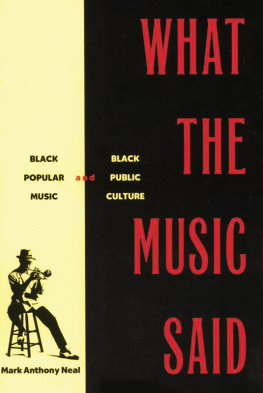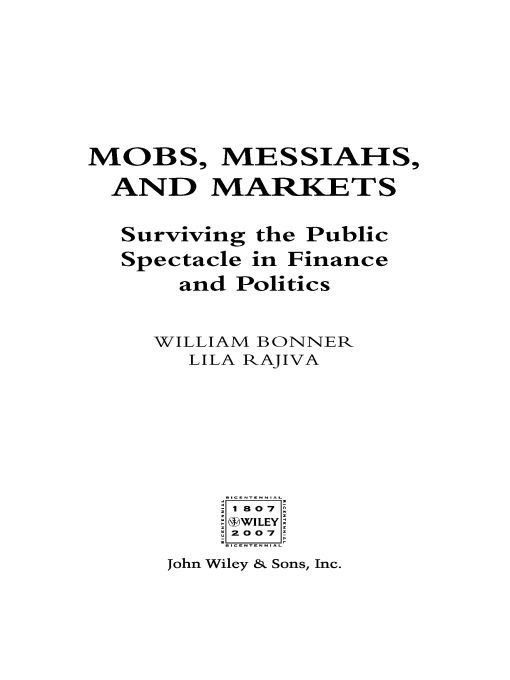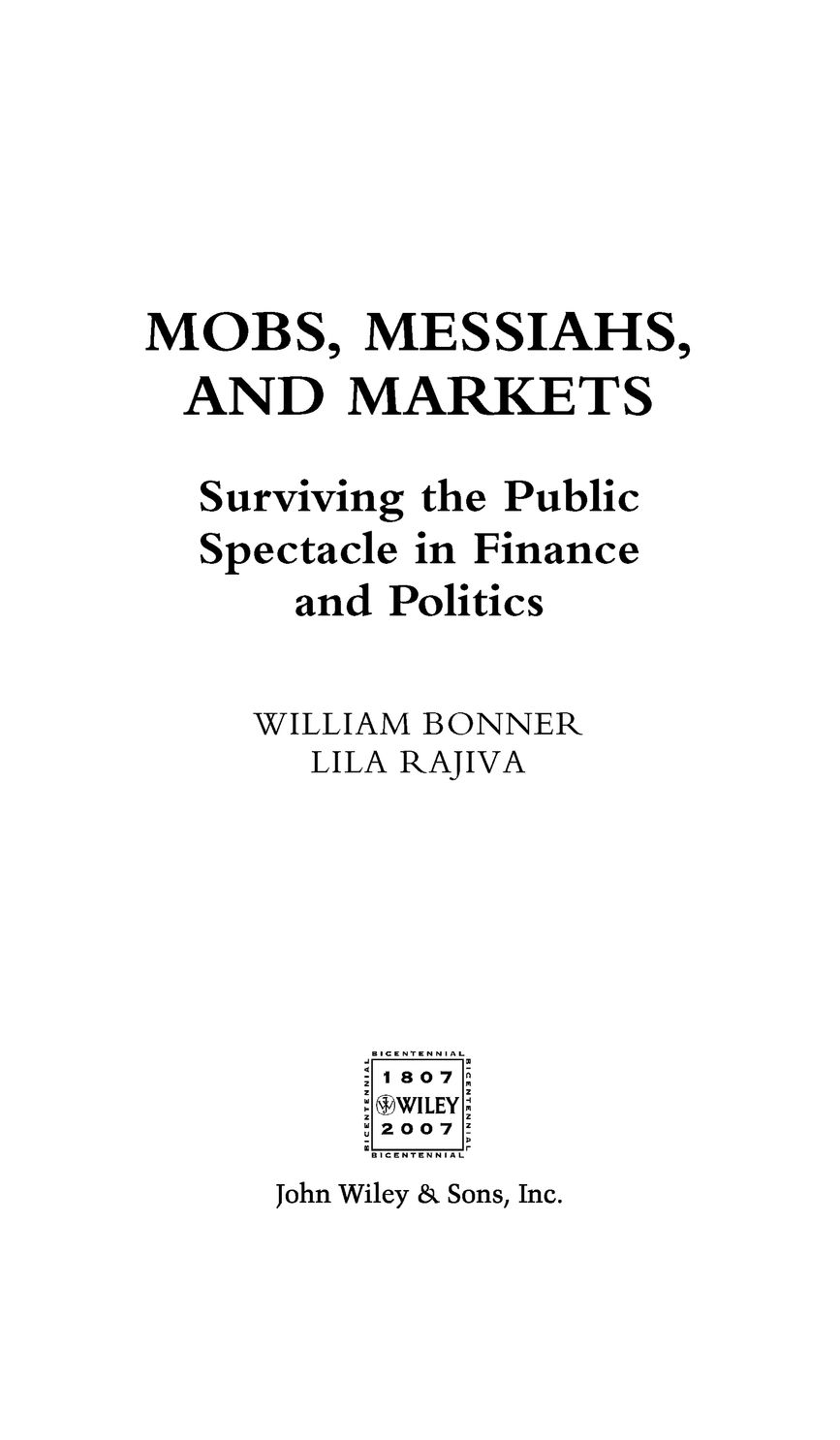Table of Contents
FOREWORD
Mobs, Messiahs, and Markets by Bill Bonner and Lila Rajiva will never earn a Nobel Prize in economics. Why? Because this book is highly readable, makes sense, and does not contain the usual incomprehensible mumbo jumbo one finds in other financial and economic books. Mobs, Messiahs, and Markets makes very complex economic, social, and geopolitical issues understandable to normal people like you and me. What Barbara Tuchman did by writing informative and absorbing history books, Bonner and Rajiva do with this highly entertaining book written for the general public to help people understand politics and finance.
But who would have the time to read this close-to 400 page book? These days, most people are happy to gain knowledge and become informed about everything everywhere in the world from 30-second shots on TV news channels! Still, in my opinion they would be making a grave error if they did not find the time to read Mobs, Messiahs, and Markets.
Here is why. Books should be read for one or both of two reasons. Since reading is physically and mentally rather demanding, I obviously want to read a book that is informative, increases my knowledge, and is thought provoking. Otherwise, why bother? The other reason I would want to read a book is for pure enjoyment. Either the authors capture my attention through the complex plot of a thriller or a tragic drama or they do it through their superb command of the English language and their ability to make me laugh.
Well, I read the manuscript of this book on flights from Bangkok to Ho Chi Minh City, from Ho Chi Minh City to Singapore, from Singapore to Shanghai, and from Shanghai to Dubai, and I read it on China Beach in Vietnam. On each of those flights, people were staring at me, because I would repeatedly burst out laughing. Mobs, Messiahs, and Markets is one of the funniest and most entertaining books I have ever read. But, besides that, Bonner and Rajiva are also accomplished and honest historians who expose the dangerous conspiracy engineered with lies and deception by American elites, politicians, Wall Street, and the U.S. Federal Reserve, whose effect is to shift wealth from the middle and working classes to the elites and their cronies.
Referring to the eroding purchasing power of the U.S. dollar, Bonner and Rajiva note that even as the Federal Reserve increased the quantity of banknotes, the quality of the notes declined. The problem, they argue, is that while political power is in Washington and financial power lies in New York, the real power is where the two come together in the Federal Reserve system. And while the Fed may have been chartered to protect the currency, its new job is only to get the politicians reelected and keep the money flowing in order to give people the impression that they are economically better off. Not surprisingly, Bonner and Rajiva have a low opinion of central bankers. Modern central banking, like bank robbing, is a nefarious mtier, they write. But while Bonnie and Clydes crimes were obvious and deplorable, a central banker is often confused with an honest man.
In the world of finance, there are thousands of books on how to value stocks and on technical analysis, currencies, commodities, bonds, and macroeconomics; but there are hardly any books that capture the zeitgeist of gigantic financial excesses. Edwin Lefvres Reminiscences of a Stock Operator, based on the life of the legendary Jesse Livermore, was an enormously popular book that became a classic about the investment mania of the late 1920s. I predict that Mobs, Messiahs, and Markets will in time become as much a classic for the student of the current period in history, because it combines so many interesting aspects of psychology, politics, and finance into a captivating narrative. I am confident that the first edition of this book will command a high price among collectors of rare books in the future and that your children will one day shake their heads and wonder how todays generation could have been so badly deceived by blatant lies, would-be reformers, military messiahs, and world improvers.
In fact, Mobs, Messiahs, and Markets is such an excellent book that if I had to name just one book investors should read, this is the one I would select.
MARC FABER
ACKNOWLEDGMENTS
Writing a book is hard enough. Writing a book with someone else is even harder. And it ought not to be possible at all when one of the authors is running a multimillion-dollar publishing business from London and Paris and the other is wandering the globe with her laptop.
As it turned out, it was not only possible but a lot of fun. Despite time zones often a day apart, treacherous Net connections, and plenty of friendly tussling over everything from financial flows in India to Latin American politicians, we found enough common ground to write a book that takes on the public spectacle in politics and the market today. Ours is the home inspectors report on the wormy wreck of government policies and prescriptions that experts and ideologues are selling us.
The book is put together from joint and individual writing we did over the past year or two. Some of it has appeared online; some has not. John Mauldin speaks for many fans in calling Bill the best pure writer in the financial business. In some sectionssuch as the ones on financeits more of Bill; in otherssuch as the ones on globalization and propagandaits more of Lila. Everywhere else, we are equally culpable.
As with any book, there are people whose help we want to acknowledge. On Bills side, there was Claire Lamotte from the Agora office in Paris, who helped with proofing. On Lilas end, as always, she owes everything to her parents, Adolf and Sylvia Walter, and to her brothers, Noel and David, for their endless support and encouragement.
Finally, both of us want to acknowledge Addison Wiggin, Mike Ward, and Danielle Morino at Agora for the marketing of this book, Jean Hanke for logistical help, our agent Theron Raines for his advice, and the team at John Wiley & SonsDebra Englander, Mary Daniello, Greg Friedman, and Stacey Smallfor their work putting together the manuscript.
Do we have any prescription at the end of it all? Noif that means suggesting what we ought to do. Yesif it means suggesting what we ought not to do. And what we ought not to doas the Good Book tells usis clear: We ought not to put our faith in princes and powers; we ought not to be taken in by the public spectacle.
WILLIAM BONNER
LILA RAJIVA
Part One
A Critique of Impure Reason
CHAPTER 1
DO-GOODERS GONE BAD
All reformers are bachelors.
George Moore
It is a shame that the world improvers dont set off some signal before they go bad, like a fire alarm that is running out of juice. Maybe some adjustment could be made. Instead, the most successful of themsuch as Benito Mussolini and Adolf Hitleractually gain market share as they get worse. Their delusions are self-reinforcing, like the delusions of a stock market bubble; the higher prices go, the more people come to believe they make sense.
The do-gooders who never catch on, of course, are hopeless from the get-go. Take poor Armin Meiwes. The man thought he had a solution to the problems of poverty and overpopulation. He was, no doubt, discussing his program with Bernard Brandes just before the two cut off Brandes most private part and ate it. Then, wouldnt you know it, Brandes died, either as a result of blood loss from the butchering or as a consequence of Meiwes slitting his throat. And then the press made a big stink about it, branding Meiwes the Cannibal of Rotenburg. But Meiwes was not merely a pervert; he was an activist.










